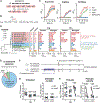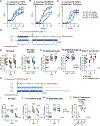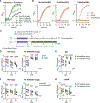Amino acid competition shapes Acinetobacter baumannii gut carriage
- PMID: 40763731
- PMCID: PMC12375414
- DOI: 10.1016/j.chom.2025.07.003
Amino acid competition shapes Acinetobacter baumannii gut carriage
Abstract
Asymptomatic colonization is often critical for persistence of antimicrobial-resistant pathogens, such as Acinetobacter baumannii, and can increase the risk of clinical infections. However, the ecological factors shaping A. baumannii gut colonization remain unclear. We show that A. baumannii and other pathogenic Acinetobacter evolved to utilize the amino acid ornithine, a non-preferred carbon source, to compete with resident microbiota and persist in the gut in mice. A. baumannii encodes ornithine succinyltransferase (AstO) necessary for catabolizing ornithine, especially in conditions of increased microbial diversity. Supplemental dietary ornithine promotes long-term fecal shedding of A. baumannii. By contrast, supplementation of preferred carbon sources-monosodium glutamate or histidine-abolishes the requirement for ornithine catabolism. Additionally, A. baumannii gut carriage is higher in formula-fed human infants, who generally consume higher levels of protein, revealing dietary impacts on Acinetobacter colonization. Together, these results reveal that ornithine catabolism facilitates A. baumannii colonization, providing a reservoir for pathogen spread.
Keywords: Acinetobacter baumannii; antimicrobial resistance; carbon preference; dietary supplements; gut colonization; microbiome; microbiota; ornithine.
Copyright © 2025 The Authors. Published by Elsevier Inc. All rights reserved.
Conflict of interest statement
Declaration of interests The authors declare no competing interests.
Figures






Update of
-
Amino acid competition shapes Acinetobacter baumannii gut carriage.bioRxiv [Preprint]. 2024 Oct 19:2024.10.19.619093. doi: 10.1101/2024.10.19.619093. bioRxiv. 2024. Update in: Cell Host Microbe. 2025 Aug 13;33(8):1396-1411.e9. doi: 10.1016/j.chom.2025.07.003. PMID: 39502362 Free PMC article. Updated. Preprint.
References
-
- World Health Organization (2024). WHO Bacterial Priority Pathogens List, 2024: Bacterial Pathogens of Public Health Importance to Guide Research, Development and Strategies to Prevent and Control Antimicrobial Resistance (World Health Organization; ).
MeSH terms
Substances
Grants and funding
LinkOut - more resources
Full Text Sources

